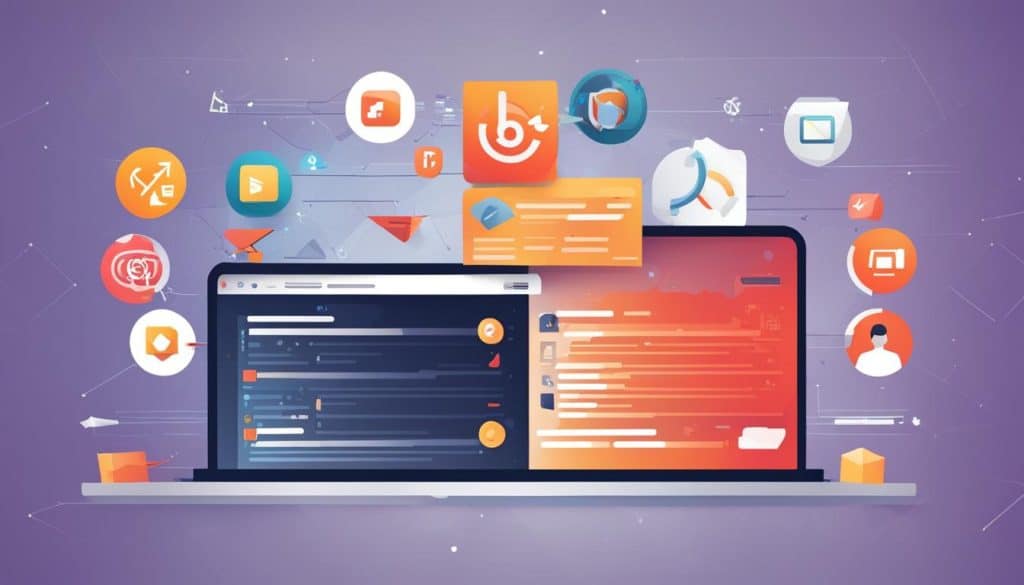In the world of search engine optimization (SEO), off-page optimization is key. It helps your website rank higher and get more visitors. Techniques like link building, social media marketing, and guest posting are important.
Off-page optimization means doing things outside your website to make it better. It’s about getting quality backlinks and being active on social media. It also means creating valuable content and managing your online image.
By focusing on off-page SEO, you can reach more people and get better rankings. Search engines look at things like backlinks and social media when ranking websites. So, using these strategies is key for success.
Want to boost your SEO? This article will cover the basics of off-page optimization. We’ll look at how to improve your rankings and get more visitors.
Key Takeaways:
- Off-page optimization is vital for better rankings and more visitors.
- Important SEO techniques include link building, social media marketing, and guest posting.
- Getting quality backlinks and being active on social media are key. So is creating valuable content for other sites.
- Managing your online reputation helps build trust and credibility.
- Using off-page optimization is essential for long-term success and attracting more visitors.
What Is Off-Page SEO?
Off-page SEO, or off-site SEO, is about improving your website’s visibility and rankings outside of it. It involves activities like link building and social media marketing. The goal is to show your website’s expertise and trustworthiness.
Why Is Off-Page SEO Important?
Off-page SEO is critical for better rankings, more visibility, and a strong online reputation. It helps attract more visitors and build trust. Let’s see why it’s important for your online success.
Improved Search Engine Rankings
Off-page SEO can greatly improve your search engine rankings. Search engines see backlinks from other sites as a vote of confidence. More quality backlinks mean higher rankings.
Increased Website Visibility
Off-page SEO boosts your website’s visibility. By using social media and influencer outreach, you can reach more people. More visibility means more chances for your content to be found and shared.
| Benefits of Off-Page SEO | Improvements |
|---|---|
| Improved search engine rankings | Higher visibility in search results |
| Increased website visibility | Greater reach and exposure |
| Enhanced online reputation | Established trust and credibility |
| Higher user engagement | Increased interaction and conversions |
Enhanced Online Reputation
Your online reputation is key to attracting and keeping customers. Using SEO techniques like online reputation management can make your brand look good. It lets you answer customer feedback and show you care about satisfaction.
By managing your online image well, you build trust. This makes people more likely to choose your brand over others.
User Engagement and Interaction
Talking to your audience is important for keeping customers and getting more. Off-page SEO techniques like social media and influencer outreach help you do this. By joining in on discussions and sharing useful content, you can make your audience feel valued.
This approach strengthens your relationship with users. It also boosts your chances of turning visitors into customers.
Off-page SEO is a big part of a good digital marketing strategy. It boosts your search rankings and makes your site more visible. It also helps build a strong online reputation and encourages user engagement.
By focusing on off-page optimization, you can make your brand a trusted authority. This gives you an edge online.
On-Page SEO vs. Off-Page SEO
There are two main ways to optimize your website for search engines: on-page SEO and off-page SEO. Both are important for making your site more visible and authoritative.
On-page SEO improves your site’s content, meta tags, and links. It makes your site better for users and search engines.
Off-page SEO works outside your site. It builds your site’s reputation and visibility online. Strategies include link building and social media marketing.
On-page SEO helps search engines understand your site. Off-page SEO shows the value and relevance of your site. Using both can improve your site’s visibility and rankings.

Key Differences Between On-Page SEO and Off-Page SEO
Here’s a quick breakdown of the key differences between on-page SEO and off-page SEO:
| On-Page SEO | Off-Page SEO |
|---|---|
| Optimizes elements within the website | Focuses on activities outside of the website |
| Improves user experience, relevancy, and authority | Establishes reputation and visibility |
| Includes optimizing content, meta tags, URLs, and internal linking | Includes link building, social media marketing, influencer outreach, and online reputation management |
| Helps search engines understand website’s content | Helps establish website’s reputation across the web |
| Affects user experience within the website | Impacts website’s visibility and authority |
Find the right mix of on-page and off-page SEO to boost your website’s visibility and authority. Use on-page optimization elements to make your site better for users. At the same time, use off-page SEO techniques to build your site’s reputation and get more internet visibility.
Off-Page SEO Techniques
Good off-page SEO is key to making your website more visible and authoritative. Use different strategies to boost your off-page optimization efforts. This will help more people find your site naturally.
Link Building
Link building is a major off-page SEO tactic. It means getting backlinks from other trusted sites. These backlinks tell search engines your site is reliable and worth visiting. A good network of backlinks can make your site more credible and improve its search rankings.
Social Media Marketing
Social media is vital for off-page SEO. Share your content and brand on sites like Facebook, Twitter, and Instagram. This can help you reach more people and get more traffic to your site. Engage with your followers, share interesting content, and encourage them to share your posts too.
Influencer Outreach
Working with influencers is another strong off-page SEO strategy. Partner with people in your field to reach their followers. This can include guest posts, podcasts, or webinars. It’s a great way to show your expertise, attract new audiences, and get quality backlinks.
Online Reputation Management
Managing your online reputation is critical for a positive image and trust. Keep an eye on customer feedback and respond to it. This shows you care about your customers and helps build your brand’s image. A good reputation can attract more visitors to your site.

| Off-Page SEO Techniques | Description |
|---|---|
| Link Building | Acquire backlinks from authoritative and relevant websites to improve credibility and search engine rankings. |
| Social Media Marketing | Promote content and brand on popular social media platforms to expand reach and visibility. |
| Influencer Outreach | Collaborate with influential individuals to tap into their audiences and gain exposure for your brand. |
| Online Reputation Management | Monitor and respond to customer reviews and mentions to build trust and credibility. |
Bonus Off-Page SEO Techniques
While main off-page SEO techniques boost your site’s visibility and authority, there are extra techniques to enhance your online presence. These include:
1. Content Marketing
Content marketing means creating and sharing valuable content to draw in your target audience. By making relevant and informative content, your site becomes a trusted source in your field. This attracts organic traffic, encourages social shares, and gets backlinks from other sites.
2. Guest Posting
Guest posting lets you write articles for other websites in your niche. Sharing your knowledge with a broader audience boosts your brand’s visibility, reaches new customers, and gets backlinks to your site. Choose reputable sites with the right audience for the best results.
3. Online Directories
Listing your site in online directories can make it more visible and attract targeted traffic. Online directories list businesses, helping users find what they need. Being listed in trusted online directories increases your chances of being found by customers.
4. Local Citations
Local citations are online mentions of your business’s name, address, and phone number (NAP) on sites like local directories, review platforms, and social media. Having consistent local citations helps search engines and users trust your business info, boosting your local SEO. Make sure your NAP details are correct and consistent everywhere.
Adding these bonus off-page SEO techniques to your digital marketing strategy can increase your site’s visibility, attract more people, and boost your online authority.

| Technique | Description |
|---|---|
| Content Marketing | Creating and promoting high-quality content to attract and engage your target audience. |
| Guest Posting | Contributing valuable articles to other websites to reach a wider audience and earn backlinks. |
| Online Directories | Submitting your website to online directories to improve online visibility. |
| Local Citations | Ensuring consistent online mentions of your business name, address, and phone number. |
Multi Location SEO
In today’s digital world, having a strong online presence is key for businesses with many locations. Multi location SEO is a special kind of local SEO. It helps make websites with many locations more visible and brings in more visitors to each place.
Using good multi location SEO strategies can make your business shine in search results. It also draws in local customers looking for specific products or services.
Strategies for Multi Location SEO
To make your website better for many locations, consider these strategies:
- Create location-specific landing pages: Make special pages for each location. These should have content that fits the local audience, like local keywords, business info, and customer feedback.
- Optimize Google My Business profiles: Take control of your Google My Business profiles for each spot. Make sure the info is right, pick the right categories, add good photos, and ask for reviews.
- Manage online reviews and ratings: Keep an eye on and answer customer feedback for each spot. Good reviews can help your reputation and bring in more people, while fixing bad reviews shows you care about your customers.
By using these strategies, you can make your website more visible. This way, people in each area can find your business when they search online.
Franchise SEO
Franchise businesses, which operate under a parent company and have multiple locations, can also benefit from franchise SEO. Franchise SEO involves optimizing websites for each individual franchise location to enhance visibility and drive targeted traffic.
This optimization ensures that each franchise location is found in local search results, attracting customers who are specifically searching for products or services in their area.
Similar to multi location SEO, franchise SEO relies on strategies like creating location-specific landing pages, optimizing Google My Business profiles for each franchise location, and managing online reviews and ratings.
| Multi Location SEO | Franchise SEO |
|---|---|
| Optimizes websites with multiple physical locations | Optimizes websites for franchise businesses |
| Creates location-specific landing pages | Creates location-specific landing pages |
| Optimizes Google My Business profiles for each location | Optimizes Google My Business profiles for each franchise location |
| Manages online reviews and ratings for each location | Manages online reviews and ratings for each franchise location |
Both multi location SEO and franchise SEO play a vital role in improving visibility and driving targeted traffic to individual locations. By implementing these strategies, businesses with multiple physical locations or franchises can increase their online presence and attract more customers in each specific location.

Technical SEO
Technical SEO is key to making your website better and more visible online. It improves how your site works and how people see it in search results. This can lead to more visitors and a stronger online presence.
Website Performance
Technical SEO also means making your website faster. This means quicker page loads and smaller files. A quick site is better for users and helps you rank higher in search results.
Site Structure
A good site structure is vital for technical SEO. It helps search engines understand your site better. With clear navigation and organized URLs, your site becomes easier to find and use.
Schema Markup
Schema markup is a smart SEO move. It adds extra details to your site’s content for search engines. This can make your site stand out in search results and get more clicks.
Page Speed
Page speed matters a lot for users and search engines. Slow sites can lose visitors and hurt your ranking. To speed up, work on your code, use caching, and CDNs.
Mobile-Friendliness
With more people using mobiles, having a mobile-friendly site is essential. It’s good for users and search engines. Google now favors mobile-friendly sites, making it a top priority.
| Technical SEO Benefits | Actions to Take |
|---|---|
| Improved website performance | Optimize page load speed, minimize server response time, and optimize media files |
| Enhanced indexability and crawlability | Create a logical site structure with clear navigation, user-friendly URLs, and XML sitemaps |
| Increased visibility and click-through rates | Implement schema markup to provide rich information in search engine results |
| Higher search engine rankings | Improve page speed, optimize code, enable browser caching, and leverage CDNs |
| Mobile-friendly website | Ensure responsive design, optimize content for mobile devices, and prioritize mobile usability |
Digital Marketing Strategy and PPC
Off-page SEO is key to making your website more visible and ranked higher. But, it’s just part of a bigger digital marketing strategy. To really grow online, you need to mix in other tactics like PPC (pay-per-click) ads.
PPC lets you create ads that show up in search results. These ads reach people who are looking for what you offer. It’s different from old-school ads because you only pay when someone clicks on it. This makes it a smart choice for your budget.
With a solid digital marketing plan and good PPC campaigns, you can see more people, get more visitors to your site, and make more sales. PPC helps you target the right people. You can pick who sees your ads based on what they like, where they are, and what they search for. This means your ads are seen by the people most likely to be interested in what you’re selling.
Benefits of PPC in Your Digital Marketing Strategy
1. Instant visibility: Your ads can pop up at the top of search results right away with PPC. This means you can get more leads and visitors fast, without waiting for your site to rank better on its own.
2. Greater control: PPC lets you control your ads closely. You can set budgets, decide how much to pay per click, and stop your ads anytime you want.
3. Targeted reach: PPC lets you target specific keywords, places, languages, and devices. By fine-tuning your targets, you make sure your ads reach the right people at the right time.
4. Data-driven insights: PPC tools give you detailed reports on how your ads are doing. You can see things like how many people see your ads, how many click on them, and how much money you’re making. This helps you make your ads better over time.
Adding PPC to your digital marketing mix can boost your online presence. While SEO improves your site’s natural ranking, PPC helps you reach more people right away and bring in targeted visitors.
Remember, a good digital marketing plan uses many different ways to reach your goals. By combining SEO, PPC, and other digital tactics, you can grow your business in a lasting way.
Conclusion
Off-page SEO is a big part of your SEO strategy. By using link building, social media, and content marketing, you can make your site more visible and trusted. This can help your site rank better in search results.
To get better at off-page SEO, focus on building a strong online reputation. Getting quality backlinks from trusted sites tells search engines your site is reliable and should rank higher.
Also, it’s key to connect with your audience online. Through social media, working with influencers, and content marketing, you can reach more people, get them involved, and grow your site’s online presence.
By keeping up with these off-page SEO tips, you can bring more organic traffic to your site and compete well online.
FAQ
What is off-page SEO?
Off-page SEO, or off-site SEO, is about improving your site’s visibility and rankings outside of your site. It includes things like link building, social media, and content marketing.
Why is off-page SEO important?
Off-page SEO is key because it can improve your site’s rankings, make it more visible, and boost your reputation online. Search engines like backlinks from trusted sites, which can help your site rank better. Off-page SEO can also attract more people, increase engagement, and build trust.
How does on-page SEO differ from off-page SEO?
On-page SEO makes your website better by improving content, meta tags, and links. It makes your site easier to use and more relevant. Off-page SEO, on the other hand, works outside your site to make it more visible and trusted.
On-page SEO helps search engines understand your site. Off-page SEO builds your site’s reputation and visibility online.
What are some effective off-page SEO techniques?
Good off-page SEO includes getting links from other sites, using social media, and working with influencers. It also means managing your online reputation. These actions help your site be seen more and trusted more.
Are there any bonus off-page SEO techniques?
Yes, content marketing is a great bonus technique. It means creating and sharing valuable content to attract people. Guest posting and getting listed in directories can also help your site be seen more.
What is multi location SEO?
Multi location SEO helps sites with many locations. It makes sure each location has its own page and is easy to find online. It’s key for getting more people to visit each location.
What is technical SEO?
Technical SEO makes your site run better and be easier for search engines to find. It includes things like making your site fast and easy to use on phones. It’s important for getting your site to show up in search results.
What other tactics can enhance my online presence?
Using PPC (pay-per-click) ads is another way to get noticed online. You pay only when someone clicks on your ad. This can bring more people to your site.
Why is off-page optimization important?
Off-page SEO is key for getting your site seen and trusted. It includes things like getting links, using social media, and making great content. By doing these things, you can make your site more visible and successful over time.





